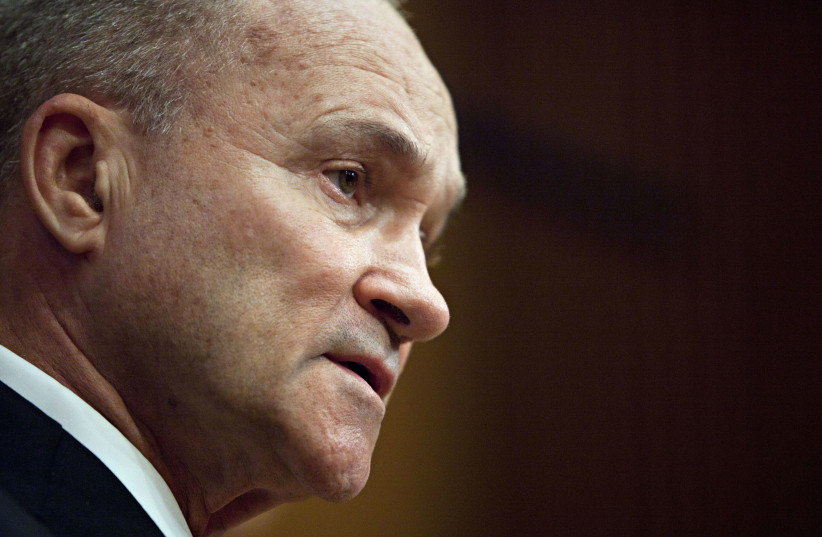“We are in a dangerous place in history,” Raymond Kelly warned.
DONNA RACHEL EDMUNDS

Jewish communities in America should follow the example of those in Europe and put security measures in place in synagogues, Former NYPD Commissioner Ray Kelly has said in an interview, as he warned that “we are in a dangerous place in history.”
Budget cuts due to the coronavirus lockdown and an erosion of respect for police officers are creating a perfect storm that will see safety decline in New York and elsewhere, Kelly told Matthew Bronfman, chair of the International Steering Committee of Limmud FSU during an online interview.
“In the US the Jewish community needs to be more alert about who is entering community premises,” Kelly said, warning that in today’s environment, synagogues cannot be fully open environments.
Kelly, who now heads the Anti-Semitism Accountability Project (ASAP), has visited ten European countries to meet with government and faith leaders to examine how antisemitism is being tackled on the Continent in comparison with the US, he said.
“Antisemitism there is not new. Neo-Nazis have never gone away, and populism is helping them flex their muscles,” Kelly noted. He acknowledged that the threat was slightly different in the two areas – in France, for example, antisemitism is driven by the left’s support for the boycott, divestment and sanctions (BDS) movement and the Muslim community, combined with a government which, thanks to a national culture of secularism, is slow to recognize the religious rights of minorities. Consequently, people can walk around with openly antisemitic messages on their t-shirts without consequence, he said.
By contrast, it is more difficult to identify antisemitism in the US. “Antisemitic groups hang out on the net – only 20% of which is registered, with the antisemitic activities taking place on the dark web,” Kelly said.
Nonetheless, Jewish groups in the US should learn from the European example in putting stronger security measures in place. An attempted attack on a synagogue on Yom Kippur last year in the German town of Halle was foiled, saving 68 souls inside the building, after the gunman failed to gain entry, although he went on to kill two bystanders.
By contrast, Kelly raised the example of the Pittsburgh’s Tree of Life synagogue shooting in October 2018 in which 11 people were murdered after a gunman walked in and opened fire.
But while antisemitism is on the rise, Kelly said that racism was not a problem endemic to the US police force itself.
“I saw the video of George Floyd’s murder and it was a shock. I have seen police brutality, but it is normally a rash act. This was deliberate, studied; it was the worst incident of police brutality I have ever seen. The outrage is understandable,” Kelly acknowledged. But, he added, “this is not what police officers do. It doesn’t happen all the time. People become police officers to do good, and to risk their lives.”
Drawing on the lessons of a 47-year career with the NYPD, including two terms as commissioner, between 1992 and 1994 and again from 2002 until 2013, making him both the longest serving commissioner and the only commissioner to hold two non-consecutive tenures, Kelly said that, as commissioner, he placed a particular emphasis on ensuring the force reflected the diversity within the city.
“I brought in police officers who come from 106 different countries,” he said.
And he warned that changes to policing in the city were making residents less safe.
Current policy in New York and elsewhere requires officers to stand down in order to de-escalate tensions, but Kelly argued that the opposite approach should be taken. “Anti-crime units in New York were canceled, though they proved very effective in reducing crime,” he said, adding that in today’s climate, more people are willing to challenge the police.
“There is no question that the police are backing off,” he said. “They wear cameras, which some think is good, while others disagree, but it makes them act slower and with greater caution. They don’t engage as they once would have done. The result is increased violence and I don’t see us getting out of this situation any time soon.”
Added to that, the coronavirus pandemic and resultant economic slowdown, combined with a cultural shift to working from home, threaten policing budgets, placing further strain on the force. Kelly suggested that the closure of businesses due to the pandemic will lead to a $9 billion hole in the city’s budget.
“We have not yet come to terms with this,” he warned. “The Zoom economy is taking hold. Businesses are boarded up, there is no police presence, people feel comfortable [working away from] their office. This will impact on residential and commercial real estate.
“We are in a dangerous place in history,” he warned, noting that New Yorkers do not feel safe out on the streets. Overall, Kelly was pessimistic. “We need a change of administration in the city. There is precipitous gun violence, and we have to factor in the police hesitation in reacting. We need a change in direction, or the greatest city in the world will continue to go downhill. I hope things will improve after the next mayoral elections in 18 months.”
The interview took place as part of an online conference series organized by Limmud FSU. Although the organization generally runs peer-led, volunteer-based gatherings of Jewish learning that specifically reach out to Russian-speaking Jews around the world, during the coronavirus pandemic it has been providing digital e-learning opportunities on general topics in addition to Jewish ones.
Content retrieved from: https://www.jpost.com/american-politics/former-nypd-commissioner-warns-us-jews-protect-your-communities-635210?fbclid=IwAR1jKz4qjTVYd3GYNHrHq4tFnPeaA-8x_eLx9Pxn2U5mCCdro5mCG2OByuY.